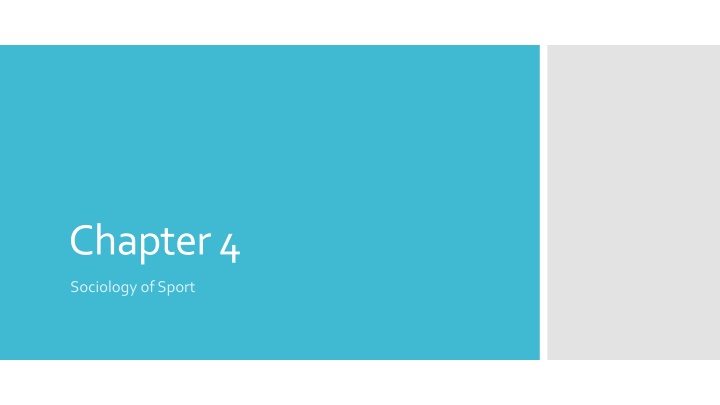
Implications of Youth Sports Sociology and Mead's Theory
Explore the sociology of youth sports, the need for advocacy guidelines, and George H. Mead's theory on child development in sports programs. Delve into the impacts of informal versus formal sports, the role of adults, and the benefits and issues in organized sports. Understand how Mead's theory relates to young athletes' behavior and team dynamics.
Download Presentation

Please find below an Image/Link to download the presentation.
The content on the website is provided AS IS for your information and personal use only. It may not be sold, licensed, or shared on other websites without obtaining consent from the author. If you encounter any issues during the download, it is possible that the publisher has removed the file from their server.
You are allowed to download the files provided on this website for personal or commercial use, subject to the condition that they are used lawfully. All files are the property of their respective owners.
The content on the website is provided AS IS for your information and personal use only. It may not be sold, licensed, or shared on other websites without obtaining consent from the author.
E N D
Presentation Transcript
Chapter 4 Sociology of Sport
4.1. Youth sports: What we know 4.2. Youth advocacy guidelines: Do we need them in sports? 4.3. George H. Mead s Theory on the development of the self: Implications for organized youth sports programs Youth Sports 4.4. The logic of sport specialization: Using children for adult purposes 4.5. Citizenship Through Sports Alliance: Youth sports report cards 4.6. Project Play: Re-creating youth sports in the U.S.
General Conclusions: Youth advocacy guidelines: Do we need them in sports? Individual children define and interpret personal experiences in many different ways. Experiences among children differ depending on whether sports are informally organized and controlled by the players themselves or whether they are formally organized and controlled by adults Informal, player-controlled sports are primarily action-centered, while formal, adult-controlled sports are primarily rule-centered. Each experience makes different contributions to the lives of children, and both have problems; however, people traditionally overrate the contributions of participation in organized sports, and underrate the contributions of participation in informal sports.
Good things happen when young people play organized sports. This statement is so widely believed in the U.S. that little attention has been given to the issue of child abuse in youth sports or to the need for identifying explicitly the responsibilities of adults who work with young athletes. Socialization and sports: A brief overview A set of Youth Advocacy Guidelines that could be used in sport settings, it is useful to consider a scale of inappropriate/abusive behaviors by coaches. The validation of the Psychological Maltreatment of Women Inventory (1999, Violence and Victims4(3), pp. 25-37). This list could be used when gathering information from child athletes.
George H. Mead s Theory on the development of the self: Implications for organized youth sports programs Mead s theory has been used to; (1) understand the process through which sport participation affects the behavior and development of young people, and (2) describe and set the limits of what can be expected from the children in organized youth sports programs. Mead states that people or selves, as he chooses to call them, are the products of social interaction. According to Mead, the reason these conceptualizations are too complex for a young child to handle at this point is that they are in what he described as the play stage of self- development. Mead referred to as the game stage of self-development. It is in this stage that children first begin to understand relationships that do not involve themselves directly. Before age 12 children don t have all the abilities to understand team strategies and positions on the field.
Sport specialization has emerged in connection with two changes in the larger society: (1) the privatization and commercialization of youth sports, and (2) the development of unique ideas about parenting, especially the definition of what constitutes a good parent. The logic of sport specialization: Using children for adult purposes These two ideas government is the problem, not the solution and there is no society, only individuals and their families Within this framework decisions and policies in both the public and private spheres have been based on the ideological assumptions that: the sole foundation of social order is personal responsibility the most effective source of economic growth is unregulated self- interest the basis of personal motivation is competition and inequalities of income and wealth
Citizenship Through Sports Alliance: Youth sports report cards In 2005, an organization called the Citizenship through Sports Alliance asked a panel of experts on youth sports to develop report cards that people could use to evaluate specific youth sports teams and programs.
In 2011, Tom Farrey, an Emmy-winning investigative journalist at ESPN was named the director of a Sports & Society Program sponsored by the Aspen Institute, a well-respected organization that encourages global discussions about cutting-edge ideas. Project Play is organized around research findings showing that under the right conditions, youth sports can be a positive tool for child development, public health, and the promotion of valuable life lessons in teamwork, resilience, and leadership. Project Play: Re-creating youth sports in the U.S. The Goals of Project Play The approach used in Project Play is based on the idea that children s access to sports participation opportunities rests on three pillars: People trained coaches and administrators Places sufficient community parks and facilities Programs appropriate to age, gender, culture, and income level
